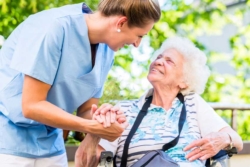In the US, elder abuse is on the rise. As the elderly population grows, so does elder abuse. Social exclusion and mental impairment may make elderly people more vulnerable to abuse. Elder abuse can occur virtually anywhere. Like the elderly person’s home, in a skilled nursing facility, or even in public. Perpetrators of elderly abuse can range from professional caregivers and family members to outsiders.
What Leads to Elderly Abuse?
Unable to defend themselves verbally or physically, the elderly are often targets of many forms of abuse. Like a young child, the elderly may find it difficult to prevent the abuse and are forced to endure it. When you suspect elder abuse, always report it and help the senior citizen file a lawsuit for elder abuse. This article sheds light on a few factors that may lead to elder abuse to better enable you to nip it in the bud.
1. Understaffing
Understaffed nursing homes often neglect their residents, primarily because there are simply not enough people for the job. Nursing home residents who are neglected are less likely to receive the care they need to maintain their physical and mental health.
This type of neglect can be devastating to nursing home residents, especially those who are immobile or have mobility issues. Falls, bedsores, muscle atrophy, and other injuries become prone and these elder abuses in nursing homes can possibly be prevented by properly staffing the facility.
2. Family Situations
When faced with the obligations of caring for a senior family member, family members can get overwhelmed and exhausted. Furthermore, these family members become prone to loneliness and may forget to recharge their social batteries.
As a result, these circumstances lead to elder abuse. Some examples include violent family history and the financial strains of a multigenerational household.
3. Caregiver Problems
Personal concerns of abusers, financial or otherwise, can make them reliant on their victims for assistance. They may also be suffering from substance dependency, mental disease, or psychological disorders. When people with these issues live with elderly people, they are more likely to be abusive.
Caring for an elderly senior who is unwell, physically disabled, or mentally disabled can be taxing on caregivers. It may make them feel helpless or trapped and unaware of what options are available to them.
Furthermore, the cost of caring for older persons with physical or mental impairments might put caregivers in a financial or physical bind. Abuse is more likely to occur if there aren’t enough resources to give adequate care.
4. Cultural Issues
Some people or communities have a negative attitude toward the elderly. They may be viewed as disposable, which increases the danger of abuse. Mistreatment of family members, particularly women, is permitted under some ethical or religious belief systems.
Additionally, certain activities may not be perceived as harmful by members of these belief systems. Victims of abuse may not identify their mistreatment as abuse.
5. Lack of Training
Sometimes, neglect is unintentional; it can occur due to a lack of adequate training in how to care for the elderly. It can also result from nursing home staff members’ inability to monitor elderly people in need consistently.
Be Better Informed
Elder abuse is a major issue. Among the surefire ways to prevent it is to educate yourself on what it is and ways to avoid it. If you know an elderly person who has been abused, many resources are available, ranging from government agencies to lawyers. If you suspect an elderly relative is being abused, seek help. We need to be better informed as a society because we shall all get old someday.





